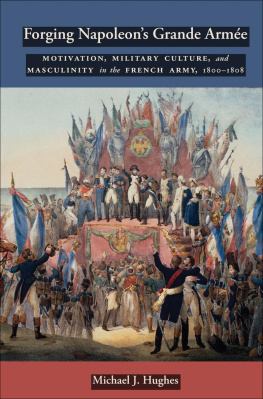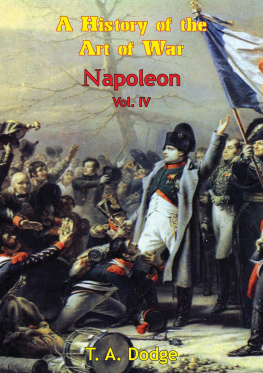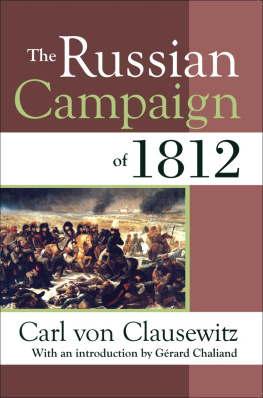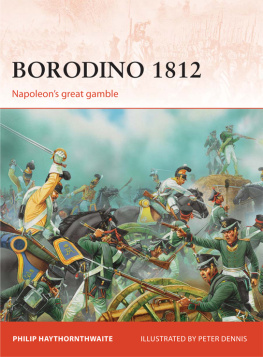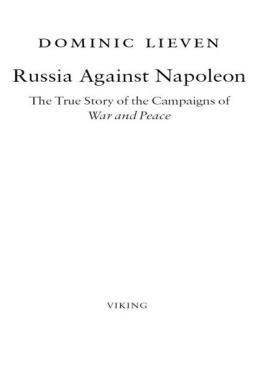This edition is published by PICKLE PARTNERS PUBLISHING
Text originally published in 1902 under the same title.
Pickle Partners Publishing 2011, all rights reserved. No part of this publication may be reproduced, stored in a retrieval system or transmitted by any means, electrical, mechanical or otherwise without the written permission of the copyright holder.
Publishers Note
Although in most cases we have retained the Authors original spelling and grammar to authentically reproduce the work of the Author and the original intent of such material, some additional notes and clarifications have been added for the modern readers benefit.
AUTHORS PREFACE
THE authors first two volumes, on Napoleon's campaigns of 1806 and 1807, dealt with the Emperor at the culminating point of his military-genius. In the third, the campaign of 1809, signs of decline had already begun to appear, and the great master neglected the relentless pursuit of the enemys main army which had hitherto been the guiding principle in all his wars.
In the campaign of 1813, described in the present volume, it is only at times that the flame of his genius burns with its old vigour. Time after time he seems to lose sight of the real objective, and to hanker after secondary objectives and the occupation of mere geographical points, the attainment of which would inevitably have followed on success in the true objective, the decisive defeat of the enemys main army.
Over Napoleons opponents a change in the opposite direction showed signs of approach. They had learnt something from their great enemy, though they still too often hesitated and were lost. Yet now the hesitation was not, as heretofore, all on their side, and the picture of Napoleon sitting at Dben in doubt and uncertainty is one which could never have been imagined of the conqueror of Ulm, of Austerlitz, or of Jena.
The whole character of the war against Napoleon had changed. He found himself no longer opposed to dynasties, but rather to whole peoples, encouraged by the examples of Spain and Russia to rise en masse against the tyranny of the oppressor.
One consequence of this was a vast increase in the numerical strength of the armies which opposed him, and a complete change in their spirit and enthusiasm. War assumed more the character of that of our own day. It became, not the war of one hired army against another, but of nations against nations. Leipzig was justly called "The battle of the Nations," and in the numbers engaged we must wait for the war of to-morrow to see it largely exceeded.
At the same time, it would be wrong to draw too close a comparison between 1813 and war in the twentieth century. The immense improvements in range and accuracy of weapons necessitate the operation of modern armies on fields many times greater, even in proportion to their numbers, than those on which Napoleon fought in 1813. This was brought very vividly before the authors eyes in the manoeuvres of the 4th French division, from which he has just returned. The general idea was the advance of Napoleon, in 1814, to the battle of Craonne, and on to that of Laon. The troops engaged, representing Napoleons army, were about one-third of his numbers; yet they covered a front two or three miles broader than he did.
Another point which gives special interest to the study of the campaign of 1813 is the breakdown, under the new conditions, of Napoleons centralised system of command. He was compelled, at least in the campaign of the autumn, to wage war with armies, not with an army of moderate dimensions always controllable by himself alone, as had been the case in his earlier campaigns. His marshals, who had served him well when they were only required to command units of the army which the Emperor controlled in person, showed themselves unfitted, as some of them had already done in Spain, for semi-independent command. When the leading strings to which they had hitherto been accustomed were perforce relaxed, Oudinot, Macdonald, and Ney in succession showed themselves incapable of walking alone. Marmont, at least, had the wisdom to foresee the result when he wrote, "I fear greatly lest on the day on which your Majesty has gained a victory, and believe you have won a decisive battle, you may learn that you have lost two." It was but a few days after this was written that Napoleon, flushed with victory at Dresden, learnt that Macdonald had been disastrously beaten on the Katzbach, that Oudinot had been checked at Gross Beeren, and Vandamme destroyed at Kulm.
All the maps and plans for this volume have been drawn by the author. The contours in the plans of Ltzen, Bautzen, Dresden, and Leipzig are taken from modern surveys, whilst the villages, woods, etc., are filled in from old maps representing them as they were in 1813.
The contours in the plans of the Katzbach, Gross Beeren, and Dennewitz are only rough conversions from old "hchured" maps.
F. L. P.
5th October 1912.
CONTENTS.
MAPS AND PLANS
(AT END OF VOLUME).
SHEET I.
GENERAL MAP OF THEATRE OF WAR.
Insets: (a) Napoleons March to the Saale in April 1813.
(b) Positions of Both Sides on 30th April 1813.
(c) Diagram of General Positions, 7th October 1813.
(d) Diagram of General Positions, 12 th October 1813.
SHEET II.
(a) The Battle of Ltzen.
(b) The Battle on the Katzbach.
(c) The Battle of Gross Beeren.
(d) The Battle of Dennewitz.
SHEET III.
THE BATTLE OF BAUTZEN.
Insets: (a) The French March from Ltzen to Bautzen, and Positions, Evening of 19th May
(b) Diagram of General Position of Both Sides at the Re-opening of Hostilities in Middle of August.
SHEET IV.
(a) The Battle of Dresden.
(b) Country South of Dresden Battle of Kulm.
(c) Prussian Passage of the Elbe on the 3rd October, AND Action at Wartenburg.
(d) The Battles about Leipzig, 16th-18th October.
(e) The Battle of Hanau.
NAPOLEONS
LAST CAMPAIGN
IN GERMANY.
CHAPTER I
AFTER RUSSIA
THE amount of ground to be covered in describing Napoleons Saxon campaign of 1813 compels economy of space in regard to events between the Emperors departure from the remains of his army of 1812 and his reappearance, in April, at the head of the new Grand Army of 1813. Still, some account, however brief, of the military and political situation, consequent on the great disaster to his arms in Russia, is necessary to the understanding of the events of 1813.
On the 5th December 1812 the defeated Emperor set out from Smorgoni on his weary journey across Europe to Paris, leaving to Murat the command of the miserable remnants of over 600,000 men who had crossed the Niemen at one time or another in the last six months. His departure has been criticised as a disgraceful abandonment of the troops who had sacrificed so much for him. That view of his conduct can only be based on ideas of chivalry which he certainly never entertained. His vast ambition had as its goal an empire such as the world had hitherto never known. In 1812 he had suffered his first great defeat, but his ambition still remained, and he was resolved on another effort to recover the power and prestige which, for the moment, he seemed to have forfeited in Europe. The question whether he should remain with his army or return to France was, from his point of view, entirely one of expediency. However much we may condemn his projects, it seems impossible to deny that, holding to them as he still did, he took the wisest course in hurrying back to France. If he did not altogether realise the magnitude of his disaster at the moment, he certainly knew that, for the next campaign, he would require a fresh army, which he alone was capable of creating, and the organisation of which demanded his presence at his capital. Moreover, he knew that his position in France was threatened in his absence by plots, and that only the magic of his personal presence could ensure its maintenance.


